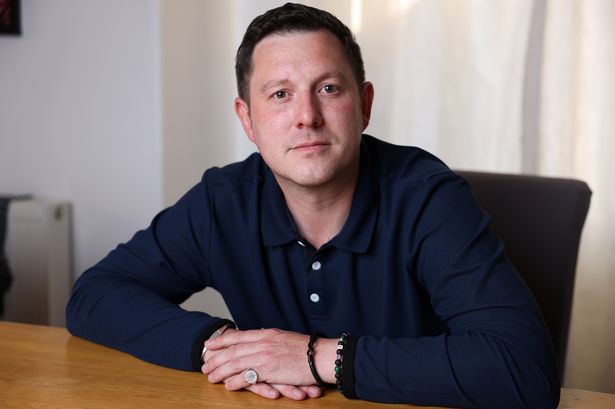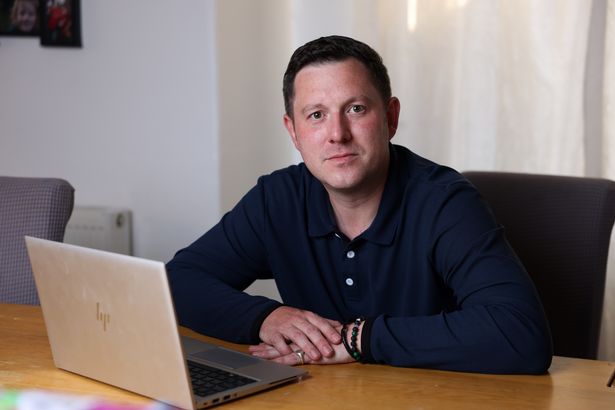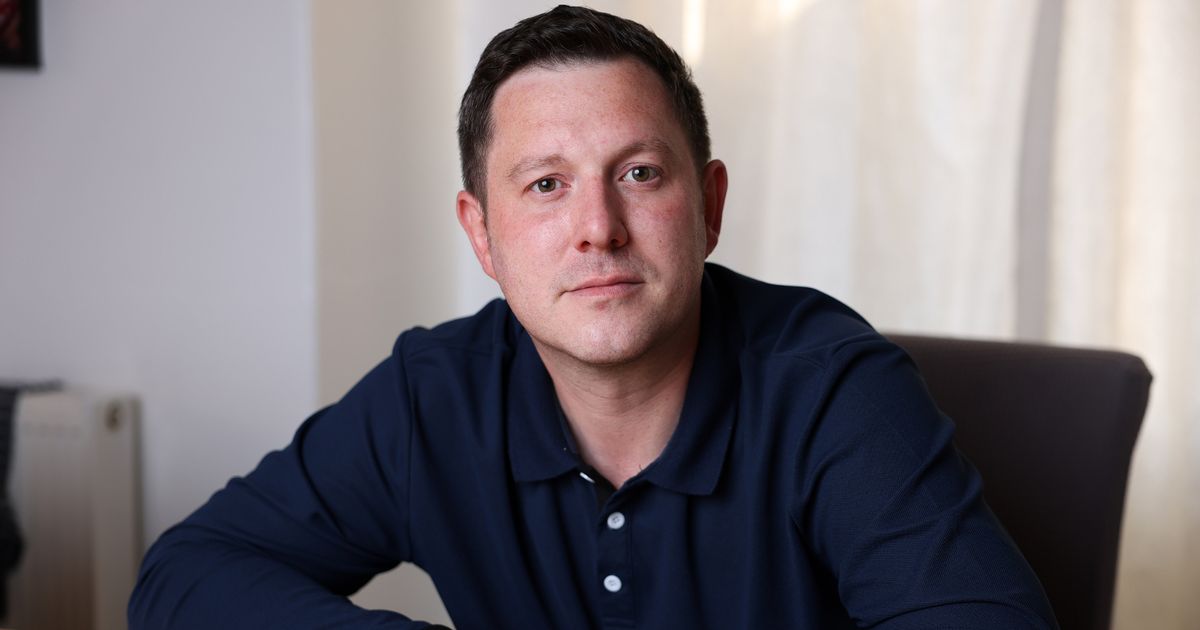Jackie Menzies says he was “stuck in a rut” for 18 years
19:49, 10 May 2025Updated 20:20, 10 May 2025
 Jackie Menzies has spoken out about his experience with gambling and alcohol (Image: Liverpool Echo)
Jackie Menzies has spoken out about his experience with gambling and alcohol (Image: Liverpool Echo)
A dad has spoken out about his addiction which saw him placing bets for 12 hours a day. Jackie Menzies, 38, from Southport, had a problem with gambling for almost two decades before seeking support last November.
Jackie has chosen to share his story this week in the wake of alarming statistics from the National Gambling Support Network (NGSN), which has supported over 110,000 people over the two years since launch. During that time, self-referrals of the service have increased by 50%.
Jackie says his gambling addiction was intrinsically linked to his alcoholism. After he started placing bets at 20, he became hooked, which led him to stealing money from loved ones, considering taking his own life and sleeping rough before he started to turn his life around
Jackie told the ECHO that gambling addiction, unlike other addictions, can be hidden easily, which led to him being dishonest with himself and others.
He said: “I was always a sociable person as a young age, going out, drinking in the pubs. I think the bright lights of the fruit machine drew me in. But I never deemed it to be a problem. It turned when I was 20. I’d been living in Spain and spent all my money living there.
“I came back and ended up working at a job earning okay money, but not a great deal. Each week I was just gambling and drinking and it just became quite ferocious.
“For some reason I was able to sustain it and got through my twenties. I met a girl, got married, had children, and all that life was just gambling and drinking associated.
“I had a good life. I can’t turn around and say, I was living in a bad situation because I wasn’t. I was happily married at that time. I had a good job.
“Gambling for me, it is so violent. It takes everything from you. I’ve always said you can see someone who’s drunk or you can see someone who’s taken drugs because their physical appearance starts to dwindle. But gambling, you could walk past someone in the street that’s just lost £10,000 and you’d have no idea.”
Jackie believes his fall into addiction stemmed from childhood. His dad, who was an alcoholic, died when he was nine years-old and as an adult Jackie used the thrill of drinking and gambling to avoid confronting how that made him feel.
He said: “It was a way of not really dealing with that situation. But it’s taken a lot of my life, the best part of 18 years away from me because I’ve been stuck in that rut.”
Mental health support
Helplines and support groups
The following are helplines and support networks for people to talk to, mostly listed on the NHS Choices website
- Samaritans (116 123) operates a 24-hour service available every day of the year. If you prefer to write down how you’re feeling, or if you’re worried about being overheard on the phone, you can email Samaritans at jo@samaritans.org.
- CALM Campaign Against Living Miserably (0800 58 58 58) is a leading movement against suicide. It runs a UK helpline and webchat from 5pm to midnight 365 days a year for anyone who has hit a wall for any reason, who need to talk or find information and support.
- PANDAS (0808 1961 776) runs a free helpline and offers a support service for people who may be suffering with perinatal mental illness, including prenatal (antenatal) and postnatal depression plus support for their family or network.
- Childline (0800 1111) runs a helpline for children and young people in the UK. Calls are free and the number won’t show up on your phone bill.
- PAPYRUS (0800 068 41 41) is an organisation supporting teenagers and young adults who are feeling suicidal.
- Mind (0300 123 3393) is a charity providing advice and support to empower anyone experiencing a mental health problem. They campaign to improve services, raise awareness and promote understanding.
- Students Against Depression is a website for students who are depressed, have a low mood or are having suicidal thoughts.
- Bullying UK is a website for both children and adults affected by bullying.
- Amparo provides emotional and practical support for anyone who has been affected by a suicide. This includes dealing with police and coroners; helping with media enquiries; preparing for and attending an inquest and helping to access other, appropriate, local support services. Call 0330 088 9255 or visit www.amparo.org.uk for more details.
- Hub of Hope is the UK’s most comprehensive national mental health support database. Download the free app, visit hubofhope.co.uk or text SHOUT to 85258 to find relevant services near you.
- Young Persons Advisory Service – Providing mental health and emotional wellbeing services for Liverpool’s children, young people and families. tel: 0151 707 1025 email: support@ypas.org.uk
- Paul’s Place – providing free counselling and group sessions to anyone living in Merseyside who has lost a family member or friend to suicide. Tel: 0151 226 0696 or email: paulsplace@beaconcounsellingtrust.co.uk
- The Martin Gallier Project – offering face to face support for individuals considering suicide and their families. Opening hours 9.30-16.30, 7 days a week. Tel: 0151 644 0294 email: triage@gallierhouse.co.uk
- James’ Place – supports men over 18 who are experiencing a suicidal crisis by providing quick access to therapy and support. Call 0151 303 5757 from Monday to Friday between 9.30am and 5.30pm or visit https://www.jamesplace.org.uk/
When asked how often he would place a bet, Jackie pauses and then said: “For 12 hours, maybe more, each day. I would wake up in the morning, sometimes not knowing whether I had money in my account.
“When it was really bad, I would sell a belonging, I would take money from my partner, I would make up an excuse to borrow money from my mum, just so I could put money on a bet.”
Jackie tended to make bets on his phone but would go to a bookmaker if he had cash on him. It didn’t matter whether he won or not. He said: “I never did it for a win, weirdly. That sensation of winning was great, but I would always just put it back in. It was about that repetition of pressing that button and seeing that machine light up.”
When asked how much money he lost in total, Jackie said: “£80 to £90,000 at least. That’s including debts and things that have been paid off, but there’s probably a lot more, if I went back into the history of my accounts.”
Jackie says the convenience of betting apps on his phone combined with the large amounts of advertising on TV fueled his problem. However, he admits responsibility for the damage he caused to those closest to him.
As he went into his thirties, Jackie’s marriage fell apart and other family members disavowed him after he was caught stealing from them. Nevertheless, he felt seeking professional help wasn’t an option.
He said: “I think it was shame that stopped me. You’re brought up with morals and I’d broken every moral I had. I was so ashamed but I had to feed the addiction. I’d tell myself, if I can put my phone down for 12 hours, I’ll be okay. But I could never do it.”
Jackie reached his lowest point last November, when he was “rightly” kicked out by his partner for stealing money from her. He said: “I was living in a park in Southport for three or four days.
“Even when I was in that situation, I was still gambling. I’d find a way to get money to put on my phone or go to a bookie and I had nowhere to stay.
“Then my friends managed to get me into a warm space where you could stay the night. That was around a week before I went into rehab.”
 Recovering gambling addict Jack Menzies at his home in Southport(Image: Liverpool Echo)
Recovering gambling addict Jack Menzies at his home in Southport(Image: Liverpool Echo)
Jackie put a post online explaining his situation, which was passed onto Cheryl Williams at NGSN provider, Adferiad, with the service he received described as “lifesaving.”
He said: “I owe Cheryl and the team at Adferiad my life. From the moment I was introduced to them, I was contacted, informed, and treated with respect and understanding for both myself and my addiction. I was guided and informed of what options might be available to me and how I might be able to get help.”
Jackie has been clean from gambling and alcohol since December 17. He has now enrolled in a counselling course at a local college to people who are suffering from addiction.
He said: “I came back out into the world on December 29. But then the real work starts in everyday life. I can’t never say never, because I don’t know what the future holds. It’s an addiction, it’s always there, you’ve got to work at it.
“But I have to keep going every day just doing the right things, getting the routine. I journal, I speak to like-minded people to support and it’s keeping me safe. I get great support from my friends and family too.”
Jackie believes greater regulation on how easy it is to gamble and the prominence of advertising can help, as well as more people seeking support.
When asked what advice he would give to people relating to his experiences, he said: “Get in touch with the National Gamble Support Network.
“They help so many people. Don’t be ashamed of it. Find, help, speak to people, get online, just make that initial call. Don’t be ashamed of it. No matter what your circumstances are, this is a killer. So just get help, get safe and just stay as strong as you can.”
The National Gambling Support Network is available for anyone who is experiencing harm from gambling and wants support for it, including people who are affected by someone else’s gambling.
All services are free and confidential. For more information, search GambleAware or contact the National Gambling Helpline, available 24/7, on 0808 8020 133.
